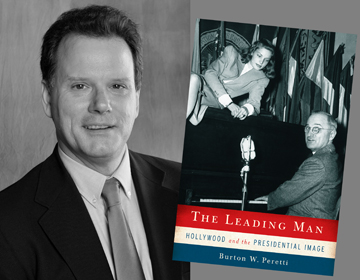
WCSU professor's book examines presidential links to Hollywood
U.S. presidents have danced with Hollywood's image-makers since the 1920s, a phenomenon Dr. Burton W. Peretti, professor of History at Western Connecticut State University, explores in a new book, The Leading Man.
Peretti shows that George Washington set the stage for presidents to take the role as the country's cultural leader, and every president from Herbert Hoover to Barack Obama has taken cues from the movie industry about how to act in public.
Peretti will read from his book and sign copies at 5:30 p.m. on Monday, April 15, in Warner Hall on Western's Midtown campus, 181 White St., Danbury. The event is free and open to the public.
"The book deepens our understanding of Hollywood's increasingly central role in American political culture and reveals the ways in which many 20th century Presidents adapted Hollywood communication techniques to sell themselves and their policies to voters," said Steven J. Ross, author of Hollywood Left and Right.
Peretti analyzes how, since the 1920s, the president, like the lead actor in a movie, has been given the central place on the political stage under the intense glare of the spotlight. Like other American men, future presidents were taught by lead movie actors how to look and behave, what to say, and how to say it.
The book also discusses image and advertising consultants who have staged politicians' public events, and who have been criticized for cheapening their offices.
The Leading Man traces the evolution and the significance of the presidential cinematic image. Peretti demonstrates how movies have been the main force in promoting appearance and drama over the substance of governing, and how Americans' lives today may be dominated by entertainment at the expense of their engagement as citizens.
Peretti is the author of four other books, including The Creation of Jazz: Music, Race and Culture in Urban America and Nightclub City: Politics and Amusement in Manhattan.
For more information, call the Office of University Relations at (203) 837-8486.